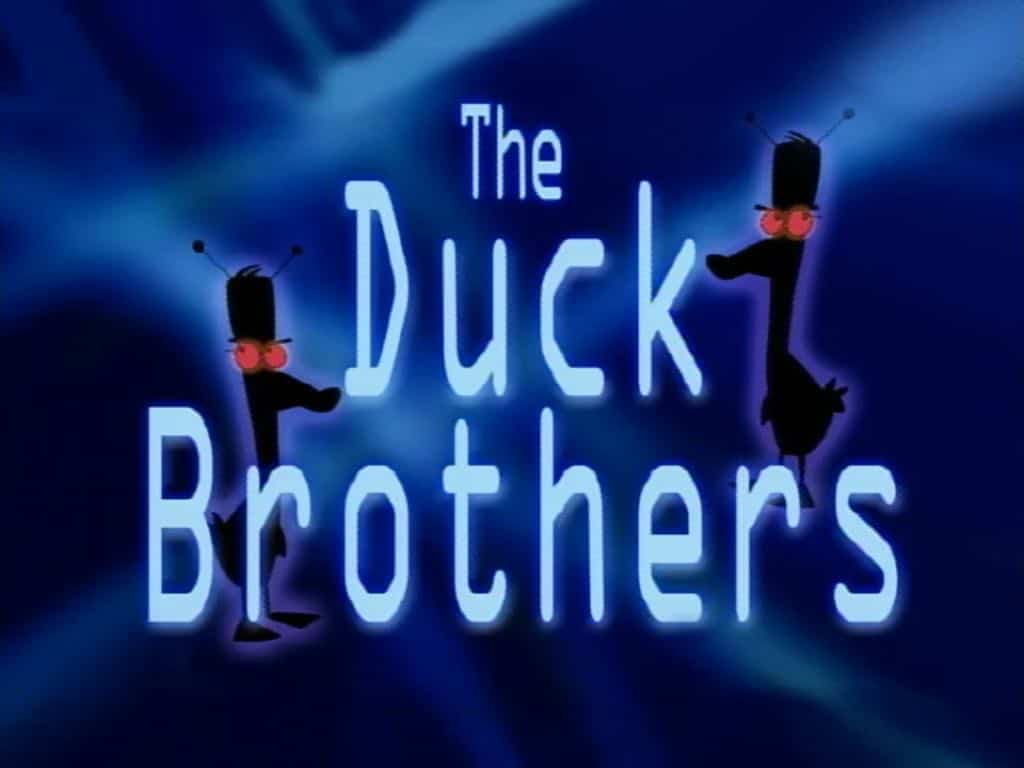“The Duck Brothers” episode of Courage The Cowardly Dog features opponents who are revealed to be not really bad, which makes for a comical big struggle scene. The big struggle scene is noteworthy for including a wide variety of small big struggles.
STORY STRUCTURE OF “THE DUCK BROTHERS”
SHORTCOMING
Courage is unable to convince Eustace when Muriel is in danger because of his lowly status as an anxious dog.
DESIRE
He wants to save Muriel.
OPPONENT
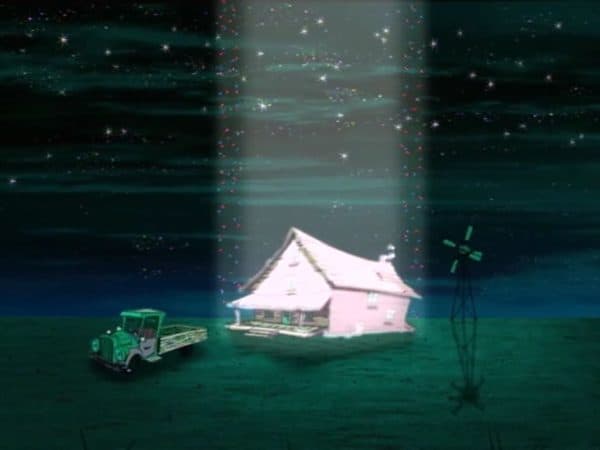
The opponents in this story come in the form of an alien spaceship, later revealed to be alien duck brothers who — though this part is never explained in the story — have abducted Muriel (and then Eustace) by mistake. They seem to speak in some approximation of an Irish accent. There would be several reasons for this:
- Irish accents have comedic value
- There’s a history of gangster/crime films featuring Irish brothers. E.g. The Boondock Saints (1999), which would have been in theatres when this episode of Courage first aired.
- During the mid 20th century Irish families tended to have very large families.
The duck brothers are constantly arguing like children. The gag is that one or both of them keeps laying eggs, which is unmanly and emasculating. (Side note: If sexism weren’t a real thing this wouldn’t be a joke that people even understand — the brothers are lowering their status as manly ducks by doing something usually only performed by their mothers and sisters.)
The chef looks like he would be an opponent. He is hairy and wears a singlet and wields a giant knife. But he is revealed later to be just a regular guy with a reasonable temperament.
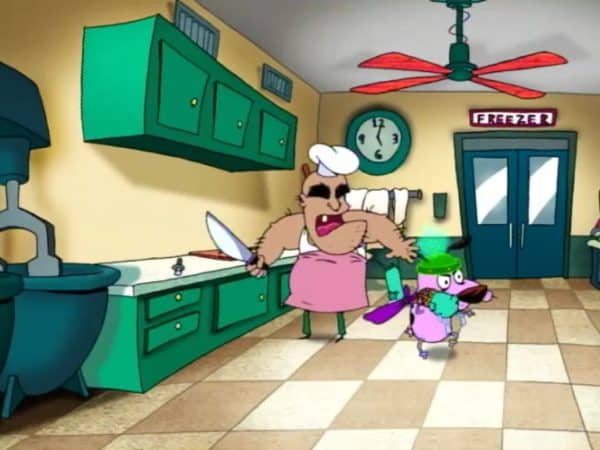
PLAN
As ever, Courage’s first move is to tell an adult, whichever of the adults happens to be unafflicted by the bad thing. This is a necessary step in children’s stories. When a child is in great danger and still does not tell any adults in their life, there has to be a reason for this already established. Perhaps the adults are terrible people, for instance. (And even then… We know Eustace is not going to believe Courage’s story that Muriel’s been abducted by aliens.) At the very least the author needs some lampshading — usually in the form of a conversation: “Mom and Dad will never believe this!”
One point about horror stories for adults in which a child character tells the responsible adult something and the adult doesn’t believe them: Don’t try to write it straight. The following is from someone who reads a lot of story submissions in the horror genre:
MOMMY, THERE’S A MONSTER IN MY CLOSET
Children are a bunch of goddamn idiots. This is a fact. So it makes sense that, in fiction, whenever a kid complains to their parents about a monster in the closet, the parent laughs at how dumb they are and sends them back to bed. (Sidenote: if any of my hypothetical kids ever came to me with a monster problem, I would be so excited, like, you have no idea, it’d be a dream come true.) But in these stories, of course there’s really a monster in the closet, and of course it wants to eat the kid. Or, sometimes, it actually wants to eat the kid’s parents, and it convinces the kid to lure them into the closet. An alternative to this story would be instead of a monster in the closet, one of the kid’s toys is eeeevil. There are enough stories about children scared in their bedroom. Please write literally anything else, you unoriginal scumbag.
LitReactor
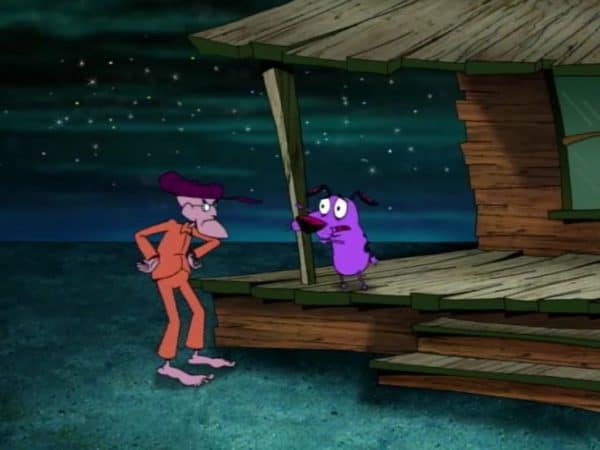
Eustace rolls over and falls back to sleep, of course, so in true Courage fashion, who keeps a close eye on the action and jumps in whenever he sees an opportunity. First up, jumping onto the back of the ute.
BIG STRUGGLE
Muriel, controlled by a device on her head, drives to a compound reminiscent of something out of a SF movie. We see a gated compound in Interstellar, for instance, or in the Netflix series Stranger Things. In SF, these factory-like establishments behind guarded gates are most often found near smallish communities where the residents live on the poverty line.
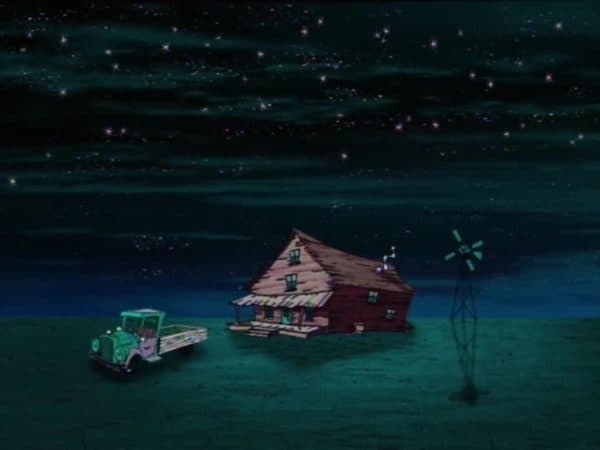
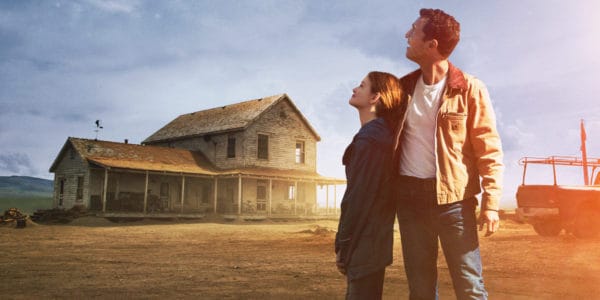
True to form, the writers choose a typical childhood game for the big struggle sequence. This time it’s piggy in the middle, after Courage locates the duck brothers inside a compound and tries to wrestle their controller off them.
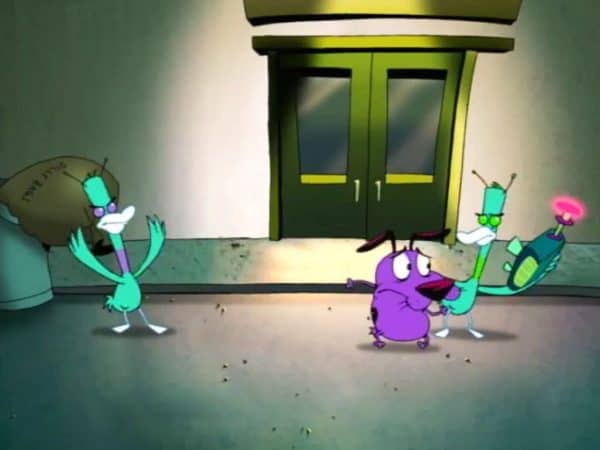
This is the device that is controlling Muriel’s movements.
There is also a food fight, this time with the duck brothers using their eggs to throw at Courage. “Aren’t you glad for these now?” one brother asks accusingly.
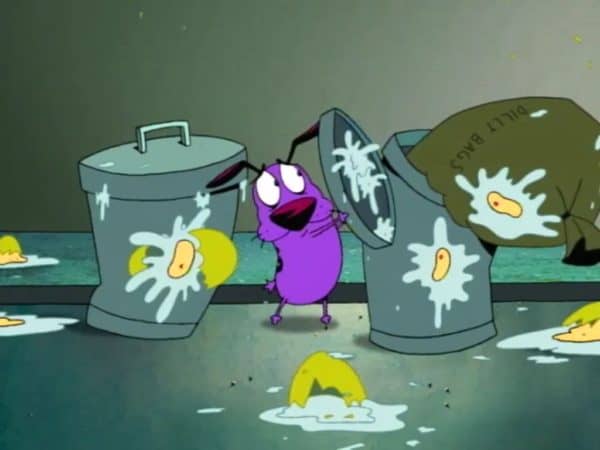
Another big struggle comes about between Courage and himself. Once wrestling the remote controller off the duck brothers he is unable to work it.
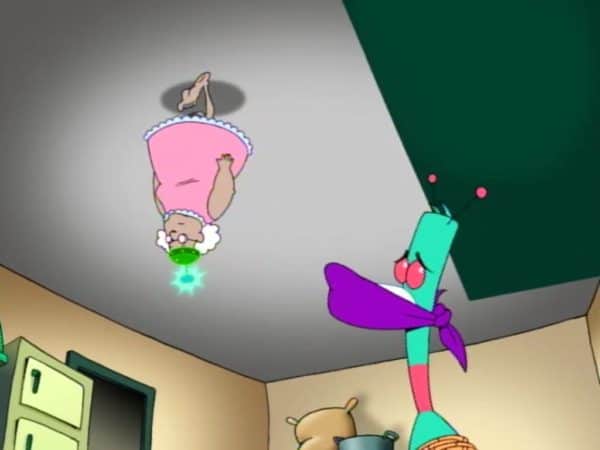
Another concurrent part of the big struggle scene centres on Muriel and Eustace (who has been captured and controlled off-screen) dancing awkwardly as the ducks seem to be playing with them like kids play with remote controlled toys.
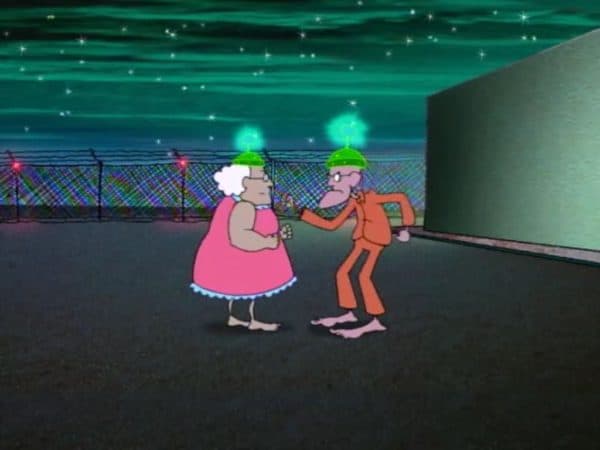
SELF-REVELATION
The duck brothers are not evil. They are just like Courage — only trying to get a loved one back.
Courage comes to the rescue, walking into the chef’s kitchen and taking back the duck.
“What am I supposed to cook now?” asks the burly chef.
“Strudel,” replies Courage in an uncharacteristically deep voice. (The whole episode is a parody of extreme masculinity.)
The chef thinks this is a great idea.
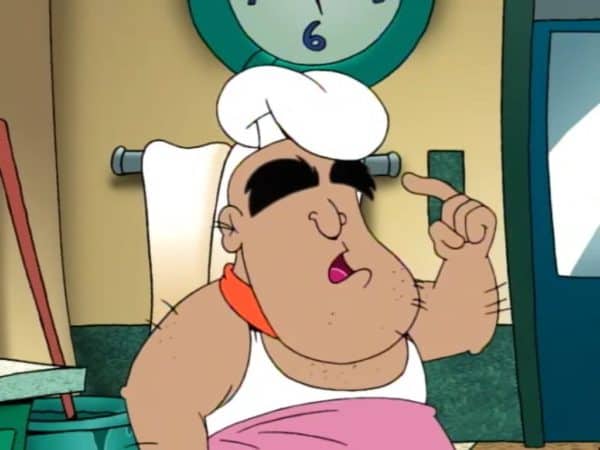
NEW SITUATION
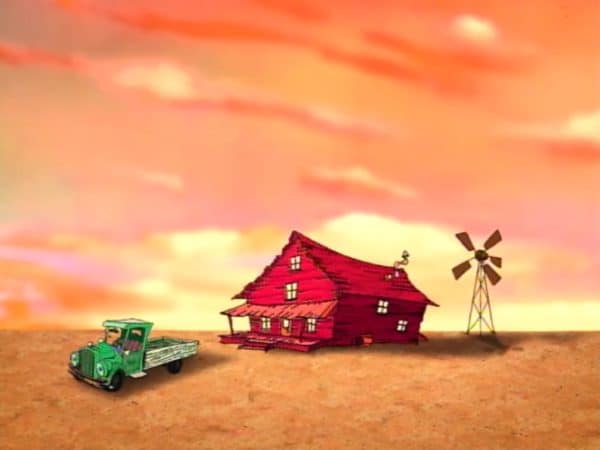
The three duck brothers have been reunited. The audience is used to a complete set of three from a tradition of fairytales and The Rule Of Threes. When we find there are three brothers instead of two that makes perfect sense to us and feels complete.
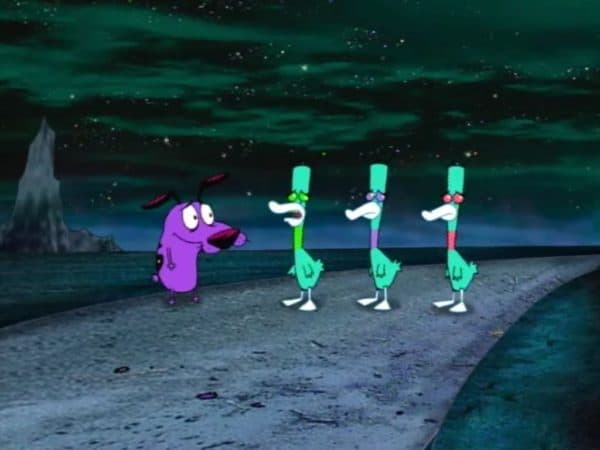
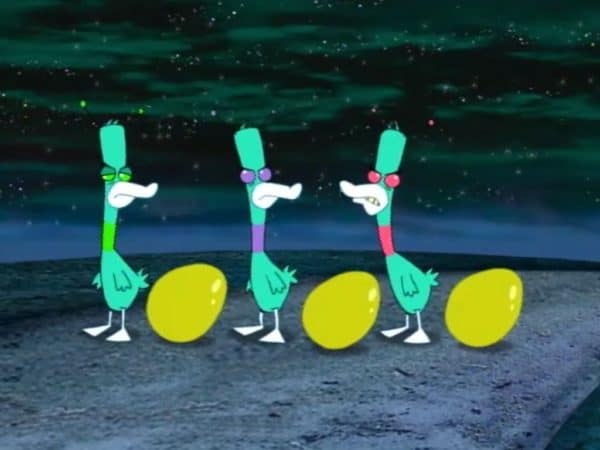
Back at home, Courage and Muriel are putting the alien duck brothers’ device to excellent use. They are using it on Eustace — who turned up earlier at the compound wearing it — to get them breakfast in bed.
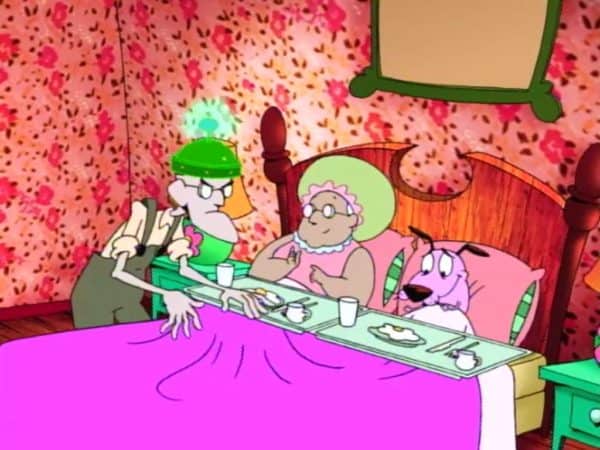
In a Refrigerator Moment, we realise there is a gated compound in Nowhere, housing a chef who — for some strange reason — has alien specimens lining the walls and who likes to cook duck but who will settle for strudel. (Hitchcock coined both ‘McGuffin’ and ‘Refrigerator Logic’. He was a man who really understood story.)
